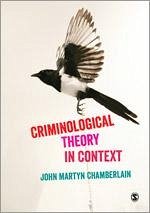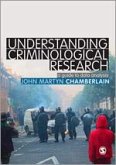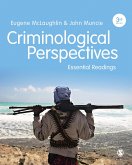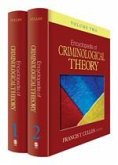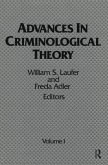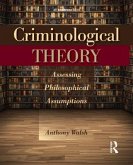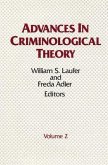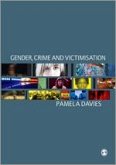John Martyn Chamberlain
Criminological Theory in Context
John Martyn Chamberlain
Criminological Theory in Context
- Gebundenes Buch
- Merkliste
- Auf die Merkliste
- Bewerten Bewerten
- Teilen
- Produkt teilen
- Produkterinnerung
- Produkterinnerung
* * * *
Andere Kunden interessierten sich auch für
![Understanding Criminological Research Understanding Criminological Research]() John Martyn ChamberlainUnderstanding Criminological Research202,99 €
John Martyn ChamberlainUnderstanding Criminological Research202,99 €![Criminological Perspectives Criminological Perspectives]() Criminological Perspectives228,99 €
Criminological Perspectives228,99 €![Encyclopedia of Criminological Theory 2 Volume Set Encyclopedia of Criminological Theory 2 Volume Set]() Francis T. Cullen / Pamela Wilcox (Hrsg.)Encyclopedia of Criminological Theory 2 Volume Set497,99 €
Francis T. Cullen / Pamela Wilcox (Hrsg.)Encyclopedia of Criminological Theory 2 Volume Set497,99 €![Advances in Criminological Theory Advances in Criminological Theory]() Advances in Criminological Theory202,99 €
Advances in Criminological Theory202,99 €![Criminological Theory Criminological Theory]() Anthony WalshCriminological Theory109,99 €
Anthony WalshCriminological Theory109,99 €![Advances in Criminological Theory Advances in Criminological Theory]() Advances in Criminological Theory206,99 €
Advances in Criminological Theory206,99 €![Gender, Crime and Victimisation Gender, Crime and Victimisation]() Pamela DaviesGender, Crime and Victimisation193,99 €
Pamela DaviesGender, Crime and Victimisation193,99 €-
-
-
* * * *
Hinweis: Dieser Artikel kann nur an eine deutsche Lieferadresse ausgeliefert werden.
Hinweis: Dieser Artikel kann nur an eine deutsche Lieferadresse ausgeliefert werden.
Produktdetails
- Produktdetails
- Verlag: Sage Publications
- Seitenzahl: 232
- Erscheinungstermin: 5. Februar 2015
- Englisch
- Abmessung: 244mm x 175mm x 18mm
- Gewicht: 499g
- ISBN-13: 9781446269862
- ISBN-10: 1446269868
- Artikelnr.: 41754376
- Herstellerkennzeichnung
- Libri GmbH
- Europaallee 1
- 36244 Bad Hersfeld
- gpsr@libri.de
- Verlag: Sage Publications
- Seitenzahl: 232
- Erscheinungstermin: 5. Februar 2015
- Englisch
- Abmessung: 244mm x 175mm x 18mm
- Gewicht: 499g
- ISBN-13: 9781446269862
- ISBN-10: 1446269868
- Artikelnr.: 41754376
- Herstellerkennzeichnung
- Libri GmbH
- Europaallee 1
- 36244 Bad Hersfeld
- gpsr@libri.de
Dr John Martyn Chamberlain is a Medical Criminologist at Southampton University. His academic background covers criminology, law, bioethics and medical sociology. His primary research interests include the study of medical malpractice, negligence and criminality, as well as the role played by specialist forms of medical and health-care expertise in the identification and governance of ¿troublesome¿ social groups, including the unwell, the deviant, and the criminally insane. Drawing on this background, he has written widely on medical-legal developments in the regulation and discipline of doctors, as well as contemporary developments in criminological theory and research, publishing two well-received introductory textbooks Understanding Criminological Research (Sage 2012) and Criminological Theory in Context (Sage 2015).
Chapter 1: Studying Criminal Life
Crime and society: an introduction
Researching criminal life: the place of theories of crime
Chapter 2: Classical Criminology and Contemporary Rational Choice Theory
Introduction: the reasoning criminal and the social contract
Society, crime and punishment
Classical criminology and crime deterrence
Neoclassical criminology
Critiquing Classical/Neoclassical criminology: does deterrence work?
Contemporary rational choice theory
Situational crime prevention, opportunity theory and routine activity
Chapter 3: Biological Criminology
Introduction: Classicism, positivism and the development of Biological
forms of criminology
Physiognomy and phrenology
Lombroso and atavism
Lombroso's heritage: in search of the criminal type
Genes and crime
Brain development, injuries and mapping
Biochemistry, hormones, diet and crime
Chapter 4: Psychological Criminology
Introduction: the Classical school and Psychological and Biological
theories of crime
Freud and personality development
Eysenck, dimensions of personality and criminal behaviour
Sutherland, differential association theory and social learning
Psychological criminology and mentally disordered offenders
Chapter 5: Strain Theory, Social Disorganisation Theory and Labelling
Theory
Introducing the sociological study of criminal life
Durkheim: social facts, social solidarity and anomie
Merton and Agnew: anomie and Strain Theory
Park and Burgess: Social Disorganisation Theory and the Broken Windows
hypothesis
Mead and Blumer: symbolic interactionism and Labelling Theory
Lemert, Becker and Erikson: towards the sociology of deviance
Restorative justice and Braithwaite's Reintegrative Shaming Theory
Chapter 6: Critical Criminology, Part 1: Marxist, Peacemaking and Realist
Theories of Crime
Determinism and free will in sociological forms of criminology
Critical criminology: a conflict theory of society
Critical criminology and the duality of structure
Karl Marx and Willem Bonger: towards a Marxist theory of crime
Marxist criminology: crime as a rational response to the conditions of
capitalism
Peacemaking criminology
Left and Right Realist criminology
Chapter 7: Critical Criminology, Part 2: Feminist and Cultural Criminology
Critical criminology and Feminist and Cultural theories of crime
The feminist critique of 'malestream' criminology
Marxism and Feminist criminology
The growth of female offending: power/control theory, the liberation
opportunity thesis and the economic marginalisation thesis
Feminism, masculinity studies and contemporary Critical criminology:
highlighting the importance of gender, race and class
Cultural criminology
Chapter 8: Postmodern Critical Standpoints and the Criminal Life Course
Introduction: Critical criminology revisited
Positivism and realism, postmodernism and anti-realism
Life Course criminology
Chapter 9: Reflecting on Theories of Crime, Theories of Human Nature: Crime
in the Age of the Enterprising Risky Citizen-subject
From modernity to high modernity
The neoliberal enterprise form and the criminal justice system
Conclusion: reflecting on theories of crime and theories of human nature
Crime and society: an introduction
Researching criminal life: the place of theories of crime
Chapter 2: Classical Criminology and Contemporary Rational Choice Theory
Introduction: the reasoning criminal and the social contract
Society, crime and punishment
Classical criminology and crime deterrence
Neoclassical criminology
Critiquing Classical/Neoclassical criminology: does deterrence work?
Contemporary rational choice theory
Situational crime prevention, opportunity theory and routine activity
Chapter 3: Biological Criminology
Introduction: Classicism, positivism and the development of Biological
forms of criminology
Physiognomy and phrenology
Lombroso and atavism
Lombroso's heritage: in search of the criminal type
Genes and crime
Brain development, injuries and mapping
Biochemistry, hormones, diet and crime
Chapter 4: Psychological Criminology
Introduction: the Classical school and Psychological and Biological
theories of crime
Freud and personality development
Eysenck, dimensions of personality and criminal behaviour
Sutherland, differential association theory and social learning
Psychological criminology and mentally disordered offenders
Chapter 5: Strain Theory, Social Disorganisation Theory and Labelling
Theory
Introducing the sociological study of criminal life
Durkheim: social facts, social solidarity and anomie
Merton and Agnew: anomie and Strain Theory
Park and Burgess: Social Disorganisation Theory and the Broken Windows
hypothesis
Mead and Blumer: symbolic interactionism and Labelling Theory
Lemert, Becker and Erikson: towards the sociology of deviance
Restorative justice and Braithwaite's Reintegrative Shaming Theory
Chapter 6: Critical Criminology, Part 1: Marxist, Peacemaking and Realist
Theories of Crime
Determinism and free will in sociological forms of criminology
Critical criminology: a conflict theory of society
Critical criminology and the duality of structure
Karl Marx and Willem Bonger: towards a Marxist theory of crime
Marxist criminology: crime as a rational response to the conditions of
capitalism
Peacemaking criminology
Left and Right Realist criminology
Chapter 7: Critical Criminology, Part 2: Feminist and Cultural Criminology
Critical criminology and Feminist and Cultural theories of crime
The feminist critique of 'malestream' criminology
Marxism and Feminist criminology
The growth of female offending: power/control theory, the liberation
opportunity thesis and the economic marginalisation thesis
Feminism, masculinity studies and contemporary Critical criminology:
highlighting the importance of gender, race and class
Cultural criminology
Chapter 8: Postmodern Critical Standpoints and the Criminal Life Course
Introduction: Critical criminology revisited
Positivism and realism, postmodernism and anti-realism
Life Course criminology
Chapter 9: Reflecting on Theories of Crime, Theories of Human Nature: Crime
in the Age of the Enterprising Risky Citizen-subject
From modernity to high modernity
The neoliberal enterprise form and the criminal justice system
Conclusion: reflecting on theories of crime and theories of human nature
Chapter 1: Studying Criminal Life
Crime and society: an introduction
Researching criminal life: the place of theories of crime
Chapter 2: Classical Criminology and Contemporary Rational Choice Theory
Introduction: the reasoning criminal and the social contract
Society, crime and punishment
Classical criminology and crime deterrence
Neoclassical criminology
Critiquing Classical/Neoclassical criminology: does deterrence work?
Contemporary rational choice theory
Situational crime prevention, opportunity theory and routine activity
Chapter 3: Biological Criminology
Introduction: Classicism, positivism and the development of Biological forms of criminology
Physiognomy and phrenology
Lombroso and atavism
Lombroso's heritage: in search of the criminal type
Genes and crime
Brain development, injuries and mapping
Biochemistry, hormones, diet and crime
Chapter 4: Psychological Criminology
Introduction: the Classical school and Psychological and Biological theories of crime
Freud and personality development
Eysenck, dimensions of personality and criminal behaviour
Sutherland, differential association theory and social learning
Psychological criminology and mentally disordered offenders
Chapter 5: Strain Theory, Social Disorganisation Theory and Labelling Theory
Introducing the sociological study of criminal life
Durkheim: social facts, social solidarity and anomie
Merton and Agnew: anomie and Strain Theory
Park and Burgess: Social Disorganisation Theory and the Broken Windows hypothesis
Mead and Blumer: symbolic interactionism and Labelling Theory
Lemert, Becker and Erikson: towards the sociology of deviance
Restorative justice and Braithwaite's Reintegrative Shaming Theory
Chapter 6: Critical Criminology, Part 1: Marxist, Peacemaking and Realist Theories of Crime
Determinism and free will in sociological forms of criminology
Critical criminology: a conflict theory of society
Critical criminology and the duality of structure
Karl Marx and Willem Bonger: towards a Marxist theory of crime
Marxist criminology: crime as a rational response to the conditions of capitalism
Peacemaking criminology
Left and Right Realist criminology
Chapter 7: Critical Criminology, Part 2: Feminist and Cultural Criminology
Critical criminology and Feminist and Cultural theories of crime
The feminist critique of 'malestream' criminology
Marxism and Feminist criminology
The growth of female offending: power/control theory, the liberation opportunity thesis and the economic marginalisation thesis
Feminism, masculinity studies and contemporary Critical criminology: highlighting the importance of gender, race and class
Cultural criminology
Chapter 8: Postmodern Critical Standpoints and the Criminal Life Course
Introduction: Critical criminology revisited
Positivism and realism, postmodernism and anti-realism
Life Course criminology
Chapter 9: Reflecting on Theories of Crime, Theories of Human Nature: Crime in the Age of the Enterprising Risky Citizen-subject
From modernity to high modernity
The neoliberal enterprise form and the criminal justice system
Conclusion: reflecting on theories of crime and theories of human nature
Crime and society: an introduction
Researching criminal life: the place of theories of crime
Chapter 2: Classical Criminology and Contemporary Rational Choice Theory
Introduction: the reasoning criminal and the social contract
Society, crime and punishment
Classical criminology and crime deterrence
Neoclassical criminology
Critiquing Classical/Neoclassical criminology: does deterrence work?
Contemporary rational choice theory
Situational crime prevention, opportunity theory and routine activity
Chapter 3: Biological Criminology
Introduction: Classicism, positivism and the development of Biological forms of criminology
Physiognomy and phrenology
Lombroso and atavism
Lombroso's heritage: in search of the criminal type
Genes and crime
Brain development, injuries and mapping
Biochemistry, hormones, diet and crime
Chapter 4: Psychological Criminology
Introduction: the Classical school and Psychological and Biological theories of crime
Freud and personality development
Eysenck, dimensions of personality and criminal behaviour
Sutherland, differential association theory and social learning
Psychological criminology and mentally disordered offenders
Chapter 5: Strain Theory, Social Disorganisation Theory and Labelling Theory
Introducing the sociological study of criminal life
Durkheim: social facts, social solidarity and anomie
Merton and Agnew: anomie and Strain Theory
Park and Burgess: Social Disorganisation Theory and the Broken Windows hypothesis
Mead and Blumer: symbolic interactionism and Labelling Theory
Lemert, Becker and Erikson: towards the sociology of deviance
Restorative justice and Braithwaite's Reintegrative Shaming Theory
Chapter 6: Critical Criminology, Part 1: Marxist, Peacemaking and Realist Theories of Crime
Determinism and free will in sociological forms of criminology
Critical criminology: a conflict theory of society
Critical criminology and the duality of structure
Karl Marx and Willem Bonger: towards a Marxist theory of crime
Marxist criminology: crime as a rational response to the conditions of capitalism
Peacemaking criminology
Left and Right Realist criminology
Chapter 7: Critical Criminology, Part 2: Feminist and Cultural Criminology
Critical criminology and Feminist and Cultural theories of crime
The feminist critique of 'malestream' criminology
Marxism and Feminist criminology
The growth of female offending: power/control theory, the liberation opportunity thesis and the economic marginalisation thesis
Feminism, masculinity studies and contemporary Critical criminology: highlighting the importance of gender, race and class
Cultural criminology
Chapter 8: Postmodern Critical Standpoints and the Criminal Life Course
Introduction: Critical criminology revisited
Positivism and realism, postmodernism and anti-realism
Life Course criminology
Chapter 9: Reflecting on Theories of Crime, Theories of Human Nature: Crime in the Age of the Enterprising Risky Citizen-subject
From modernity to high modernity
The neoliberal enterprise form and the criminal justice system
Conclusion: reflecting on theories of crime and theories of human nature
Chapter 1: Studying Criminal Life
Crime and society: an introduction
Researching criminal life: the place of theories of crime
Chapter 2: Classical Criminology and Contemporary Rational Choice Theory
Introduction: the reasoning criminal and the social contract
Society, crime and punishment
Classical criminology and crime deterrence
Neoclassical criminology
Critiquing Classical/Neoclassical criminology: does deterrence work?
Contemporary rational choice theory
Situational crime prevention, opportunity theory and routine activity
Chapter 3: Biological Criminology
Introduction: Classicism, positivism and the development of Biological
forms of criminology
Physiognomy and phrenology
Lombroso and atavism
Lombroso's heritage: in search of the criminal type
Genes and crime
Brain development, injuries and mapping
Biochemistry, hormones, diet and crime
Chapter 4: Psychological Criminology
Introduction: the Classical school and Psychological and Biological
theories of crime
Freud and personality development
Eysenck, dimensions of personality and criminal behaviour
Sutherland, differential association theory and social learning
Psychological criminology and mentally disordered offenders
Chapter 5: Strain Theory, Social Disorganisation Theory and Labelling
Theory
Introducing the sociological study of criminal life
Durkheim: social facts, social solidarity and anomie
Merton and Agnew: anomie and Strain Theory
Park and Burgess: Social Disorganisation Theory and the Broken Windows
hypothesis
Mead and Blumer: symbolic interactionism and Labelling Theory
Lemert, Becker and Erikson: towards the sociology of deviance
Restorative justice and Braithwaite's Reintegrative Shaming Theory
Chapter 6: Critical Criminology, Part 1: Marxist, Peacemaking and Realist
Theories of Crime
Determinism and free will in sociological forms of criminology
Critical criminology: a conflict theory of society
Critical criminology and the duality of structure
Karl Marx and Willem Bonger: towards a Marxist theory of crime
Marxist criminology: crime as a rational response to the conditions of
capitalism
Peacemaking criminology
Left and Right Realist criminology
Chapter 7: Critical Criminology, Part 2: Feminist and Cultural Criminology
Critical criminology and Feminist and Cultural theories of crime
The feminist critique of 'malestream' criminology
Marxism and Feminist criminology
The growth of female offending: power/control theory, the liberation
opportunity thesis and the economic marginalisation thesis
Feminism, masculinity studies and contemporary Critical criminology:
highlighting the importance of gender, race and class
Cultural criminology
Chapter 8: Postmodern Critical Standpoints and the Criminal Life Course
Introduction: Critical criminology revisited
Positivism and realism, postmodernism and anti-realism
Life Course criminology
Chapter 9: Reflecting on Theories of Crime, Theories of Human Nature: Crime
in the Age of the Enterprising Risky Citizen-subject
From modernity to high modernity
The neoliberal enterprise form and the criminal justice system
Conclusion: reflecting on theories of crime and theories of human nature
Crime and society: an introduction
Researching criminal life: the place of theories of crime
Chapter 2: Classical Criminology and Contemporary Rational Choice Theory
Introduction: the reasoning criminal and the social contract
Society, crime and punishment
Classical criminology and crime deterrence
Neoclassical criminology
Critiquing Classical/Neoclassical criminology: does deterrence work?
Contemporary rational choice theory
Situational crime prevention, opportunity theory and routine activity
Chapter 3: Biological Criminology
Introduction: Classicism, positivism and the development of Biological
forms of criminology
Physiognomy and phrenology
Lombroso and atavism
Lombroso's heritage: in search of the criminal type
Genes and crime
Brain development, injuries and mapping
Biochemistry, hormones, diet and crime
Chapter 4: Psychological Criminology
Introduction: the Classical school and Psychological and Biological
theories of crime
Freud and personality development
Eysenck, dimensions of personality and criminal behaviour
Sutherland, differential association theory and social learning
Psychological criminology and mentally disordered offenders
Chapter 5: Strain Theory, Social Disorganisation Theory and Labelling
Theory
Introducing the sociological study of criminal life
Durkheim: social facts, social solidarity and anomie
Merton and Agnew: anomie and Strain Theory
Park and Burgess: Social Disorganisation Theory and the Broken Windows
hypothesis
Mead and Blumer: symbolic interactionism and Labelling Theory
Lemert, Becker and Erikson: towards the sociology of deviance
Restorative justice and Braithwaite's Reintegrative Shaming Theory
Chapter 6: Critical Criminology, Part 1: Marxist, Peacemaking and Realist
Theories of Crime
Determinism and free will in sociological forms of criminology
Critical criminology: a conflict theory of society
Critical criminology and the duality of structure
Karl Marx and Willem Bonger: towards a Marxist theory of crime
Marxist criminology: crime as a rational response to the conditions of
capitalism
Peacemaking criminology
Left and Right Realist criminology
Chapter 7: Critical Criminology, Part 2: Feminist and Cultural Criminology
Critical criminology and Feminist and Cultural theories of crime
The feminist critique of 'malestream' criminology
Marxism and Feminist criminology
The growth of female offending: power/control theory, the liberation
opportunity thesis and the economic marginalisation thesis
Feminism, masculinity studies and contemporary Critical criminology:
highlighting the importance of gender, race and class
Cultural criminology
Chapter 8: Postmodern Critical Standpoints and the Criminal Life Course
Introduction: Critical criminology revisited
Positivism and realism, postmodernism and anti-realism
Life Course criminology
Chapter 9: Reflecting on Theories of Crime, Theories of Human Nature: Crime
in the Age of the Enterprising Risky Citizen-subject
From modernity to high modernity
The neoliberal enterprise form and the criminal justice system
Conclusion: reflecting on theories of crime and theories of human nature
Chapter 1: Studying Criminal Life
Crime and society: an introduction
Researching criminal life: the place of theories of crime
Chapter 2: Classical Criminology and Contemporary Rational Choice Theory
Introduction: the reasoning criminal and the social contract
Society, crime and punishment
Classical criminology and crime deterrence
Neoclassical criminology
Critiquing Classical/Neoclassical criminology: does deterrence work?
Contemporary rational choice theory
Situational crime prevention, opportunity theory and routine activity
Chapter 3: Biological Criminology
Introduction: Classicism, positivism and the development of Biological forms of criminology
Physiognomy and phrenology
Lombroso and atavism
Lombroso's heritage: in search of the criminal type
Genes and crime
Brain development, injuries and mapping
Biochemistry, hormones, diet and crime
Chapter 4: Psychological Criminology
Introduction: the Classical school and Psychological and Biological theories of crime
Freud and personality development
Eysenck, dimensions of personality and criminal behaviour
Sutherland, differential association theory and social learning
Psychological criminology and mentally disordered offenders
Chapter 5: Strain Theory, Social Disorganisation Theory and Labelling Theory
Introducing the sociological study of criminal life
Durkheim: social facts, social solidarity and anomie
Merton and Agnew: anomie and Strain Theory
Park and Burgess: Social Disorganisation Theory and the Broken Windows hypothesis
Mead and Blumer: symbolic interactionism and Labelling Theory
Lemert, Becker and Erikson: towards the sociology of deviance
Restorative justice and Braithwaite's Reintegrative Shaming Theory
Chapter 6: Critical Criminology, Part 1: Marxist, Peacemaking and Realist Theories of Crime
Determinism and free will in sociological forms of criminology
Critical criminology: a conflict theory of society
Critical criminology and the duality of structure
Karl Marx and Willem Bonger: towards a Marxist theory of crime
Marxist criminology: crime as a rational response to the conditions of capitalism
Peacemaking criminology
Left and Right Realist criminology
Chapter 7: Critical Criminology, Part 2: Feminist and Cultural Criminology
Critical criminology and Feminist and Cultural theories of crime
The feminist critique of 'malestream' criminology
Marxism and Feminist criminology
The growth of female offending: power/control theory, the liberation opportunity thesis and the economic marginalisation thesis
Feminism, masculinity studies and contemporary Critical criminology: highlighting the importance of gender, race and class
Cultural criminology
Chapter 8: Postmodern Critical Standpoints and the Criminal Life Course
Introduction: Critical criminology revisited
Positivism and realism, postmodernism and anti-realism
Life Course criminology
Chapter 9: Reflecting on Theories of Crime, Theories of Human Nature: Crime in the Age of the Enterprising Risky Citizen-subject
From modernity to high modernity
The neoliberal enterprise form and the criminal justice system
Conclusion: reflecting on theories of crime and theories of human nature
Crime and society: an introduction
Researching criminal life: the place of theories of crime
Chapter 2: Classical Criminology and Contemporary Rational Choice Theory
Introduction: the reasoning criminal and the social contract
Society, crime and punishment
Classical criminology and crime deterrence
Neoclassical criminology
Critiquing Classical/Neoclassical criminology: does deterrence work?
Contemporary rational choice theory
Situational crime prevention, opportunity theory and routine activity
Chapter 3: Biological Criminology
Introduction: Classicism, positivism and the development of Biological forms of criminology
Physiognomy and phrenology
Lombroso and atavism
Lombroso's heritage: in search of the criminal type
Genes and crime
Brain development, injuries and mapping
Biochemistry, hormones, diet and crime
Chapter 4: Psychological Criminology
Introduction: the Classical school and Psychological and Biological theories of crime
Freud and personality development
Eysenck, dimensions of personality and criminal behaviour
Sutherland, differential association theory and social learning
Psychological criminology and mentally disordered offenders
Chapter 5: Strain Theory, Social Disorganisation Theory and Labelling Theory
Introducing the sociological study of criminal life
Durkheim: social facts, social solidarity and anomie
Merton and Agnew: anomie and Strain Theory
Park and Burgess: Social Disorganisation Theory and the Broken Windows hypothesis
Mead and Blumer: symbolic interactionism and Labelling Theory
Lemert, Becker and Erikson: towards the sociology of deviance
Restorative justice and Braithwaite's Reintegrative Shaming Theory
Chapter 6: Critical Criminology, Part 1: Marxist, Peacemaking and Realist Theories of Crime
Determinism and free will in sociological forms of criminology
Critical criminology: a conflict theory of society
Critical criminology and the duality of structure
Karl Marx and Willem Bonger: towards a Marxist theory of crime
Marxist criminology: crime as a rational response to the conditions of capitalism
Peacemaking criminology
Left and Right Realist criminology
Chapter 7: Critical Criminology, Part 2: Feminist and Cultural Criminology
Critical criminology and Feminist and Cultural theories of crime
The feminist critique of 'malestream' criminology
Marxism and Feminist criminology
The growth of female offending: power/control theory, the liberation opportunity thesis and the economic marginalisation thesis
Feminism, masculinity studies and contemporary Critical criminology: highlighting the importance of gender, race and class
Cultural criminology
Chapter 8: Postmodern Critical Standpoints and the Criminal Life Course
Introduction: Critical criminology revisited
Positivism and realism, postmodernism and anti-realism
Life Course criminology
Chapter 9: Reflecting on Theories of Crime, Theories of Human Nature: Crime in the Age of the Enterprising Risky Citizen-subject
From modernity to high modernity
The neoliberal enterprise form and the criminal justice system
Conclusion: reflecting on theories of crime and theories of human nature

